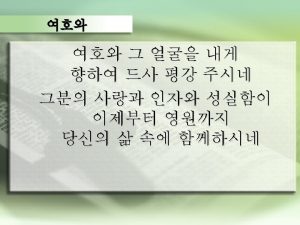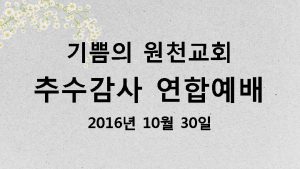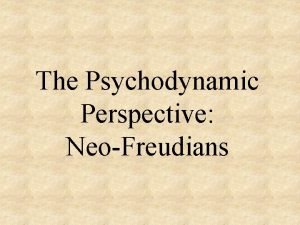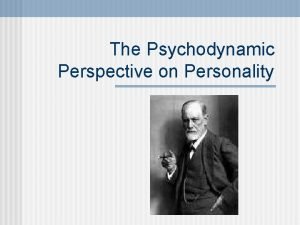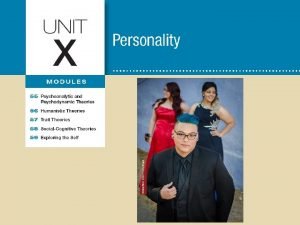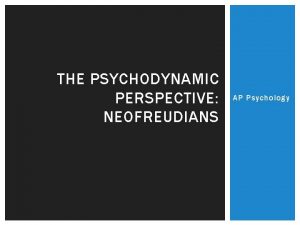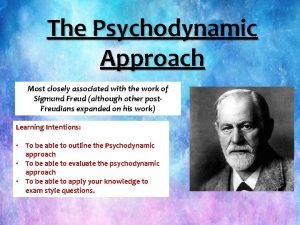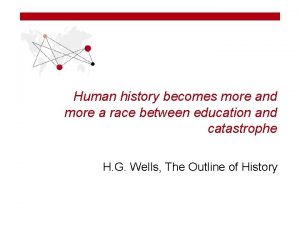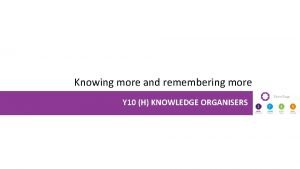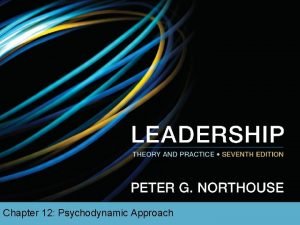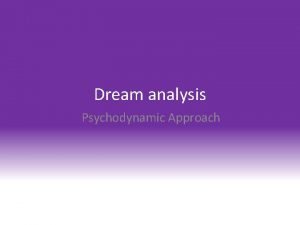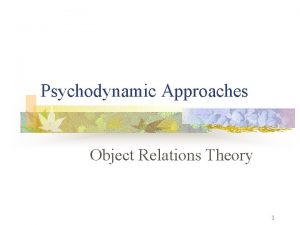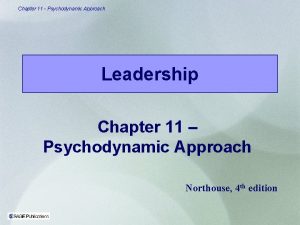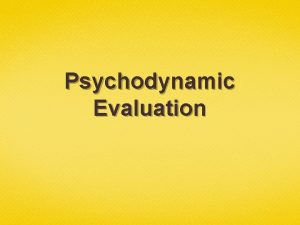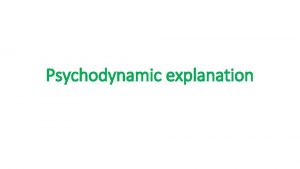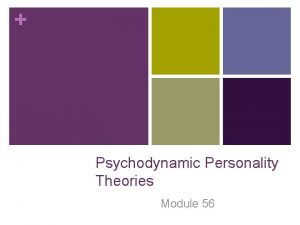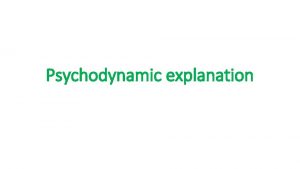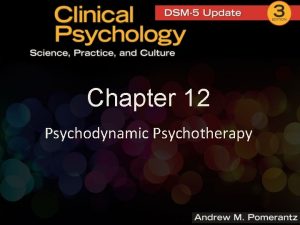The Psychodynamic Perspective NeoFreudians Psychodynamic Perspective A more

















- Slides: 17

The Psychodynamic Perspective: Neo-Freudians

Psychodynamic Perspective • A more modern view of personality that retains some aspects of Freudian theory but rejects other aspects • Neo-Freudians - Followers of Freud’s theories but developed theories of their own in areas where they disagreed with Freud • Agreed with Freud’s ideas on: – – Importance of unconscious Personality Structures of Id, Ego, Superego Shaping of personality in childhood Defense mechanisms to protect us against anxiety • Disagreed with Freud on: – Conscious mind’s role in interpreting experience & environment – Role of sex & aggression as motivating factors for our behaviors

Updating Freud’s Theory • Most psychodynamic psychologists agree: – Sex is not the basis of personality. – People do not “fixate” at various stages of development. – Much of a person’s mental life is unconscious. – Childhood experiences shape us socially and psychologically. – People struggle with inner conflicts and regulating their impulses, emotions and thoughts toward what society deems acceptable.

Psychodynamic Theories The Neo-Freudians • Alfred Adler’s Inferiority Complex • Karen Horney’s focus on Basic Anxiety & Security • Carl Jung’s Collective Unconscious

Alfred Adler (1870 -1937) • Agreed with Freud on the importance of early childhood but thought social tensions were more important than sexual tensions • Believed psychological problems were the result of feelings of inferiority from childhood • Inferiority Complex - A condition that comes from being unable to compensate for normal inferiority feelings

Alfred Adler • Most fundamental human motive is striving for superiority • Arises from universal feelings of inferiority that are experienced during childhood • People compensate for their weaknesses by emphasizing their talents and abilities or by working hard to improve themselves. • If unable to compensate or when feelings of inferiority are too great a inferiority complex can result where person feels inadequate, weak & helpless and are unable to try to improve. • If people overcompensate for their feelings of inferiority then they develop a superiority complex where one exaggerates achievements and importance to cover up their own limitations.

Karen Horney (HORN-eye)(1885 -1952) • Believed childhood anxiety (not sexual tension) trigger our need for love and security. • Found psychoanalysis negatively biased against women. – Women didn’t have “penis envy” it was instead that they envied men’s superior status in society. – Instead said men have “womb envy” and compensate by making creative achievements in their work.

Karen Horney • Looked at anxiety related to security and social relationships, especially parent-child relationships. • Basic anxiety— “the feeling of being isolated and helpless in a hostile world” • Deal with this anxiety by. – Moving Toward Other People – having an excessive need for approval & affection – Moving Against Other People – having an excessive need for power over other people – Moving Away from Other People – having an excessive need for independence making them aloof and detached from others. • Felt that healthy personalities are flexible in balancing these needs but unhealthy people are stuck in one of ways of dealing with anxiety.

Carl Jung (Yoong)(1875 -1961) • Rejected Freud’s assertion that human behavior is directed by unconscious sex & aggression. • Believed in general psychic energy that pushes us to grow psychologically. • Believed that humans share a collective unconscious—set of common themes, or archetypes inherited from the wealth of human experience & shared by all people. – “The whole spiritual heritage of mankind’s evolution born anew in the brain structure of every individual. ” • First to describe introverts & extroverts

Archetypes • Archetypes – Mental images of human instincts, themes and preoccupations that are shared by all cultures. • Often expressed in a culture’s mythology & folk tales. – “Hero” – savior or deliverer – “The Quest” – a long journey where battles, trials & challenges take place to achieve a lofty goal – “The Scapegoat” – when the hero must die or sacrifice something to save others – “Great or Good Mother” – representing warmth, fertility & abundance – “Terrible Mother or Witch” – representing danger, fear or death – “Soul Mate or Princess” – representing inspiration or fullfillment – “The Shadow” - dark side inside us all, the hero, the wise old man, the nurturing mother.

Assessing the Unconsciousness Projective Techniques • Interpretation of an ambiguous (neutral) stimulus to trigger projection of one’s inner thoughts and feelings • Used to determine unconscious motives, conflicts, & psychological defenses & traits

Thematic Apperception Test (TAT) • Person views an ambiguous picture & then makes up a story about it. • Story is thought to be a projection of their inner feelings or conflicts. • Answers are scored based on themes, motives, and anxieties of main character


Rorschach Inkblot Test • Personality test that seeks to identify people’s inner feelings by analyzing their interpretations of 10 inkblots • Numerous scoring systems exist • Used more as an icebreaker or reveal hidden themes in a person’s mind

Drawbacks to Projective Tests • Examiner or test situation may influence individual’s response • Scoring is highly subjective • Tests fail to produce consistent results (reliability problem) • Tests are poor predictors of future behavior (validity problem)

Modern Understanding of the Unconscious Mind • We do have an unconscious mind but its focus is on information processing. Examples include: – Schemas – affect our perceptions & interpretations – Priming – unconsciously affecting our thinking – Implicit Memories – Procedural memories you use without having to think about – Emotions – occur without conscious effort – Self-Concept & Stereotypes – influence how we process & understand info about ourselves and others.

Evidence for Defense Mechanisms • False Consensus Effect – Tendency to overestimate the extent others share our beliefs & behaviors – Like Freud’s idea of Projection – putting our thoughts and attitudes about ourselves onto others. – Defense Mechanisms today are viewed as a way to protect our own self-image rather than protect us from undesirable thoughts or wishes. • Terror-Management Theory – When thinking about one’s own mortality we invoke defenses to lessen the anxiety – When death is thought about we relieve anxiety by focusing on family, close relationships & religion to lessen our anxiety
 More more more i want more more more more we praise you
More more more i want more more more more we praise you More more more i want more more more more we praise you
More more more i want more more more more we praise you Neofreudianism
Neofreudianism Psychodynamic causes of schizophrenia
Psychodynamic causes of schizophrenia Freud defense mechanism examples
Freud defense mechanism examples What theories
What theories Karen horney ap psychology
Karen horney ap psychology Ocd psychodynamic perspective
Ocd psychodynamic perspective The psychodynamic perspective is closely associated with
The psychodynamic perspective is closely associated with The more you study the more you learn
The more you study the more you learn More choices more chances
More choices more chances The more i give to thee the more i have
The more i give to thee the more i have Aspire not to have more but to be more
Aspire not to have more but to be more Human history becomes more and more a race
Human history becomes more and more a race 1law of motion
1law of motion 5 apples in a basket riddle
5 apples in a basket riddle Knowing more remembering more
Knowing more remembering more Silo perspective vs business process perspective
Silo perspective vs business process perspective
